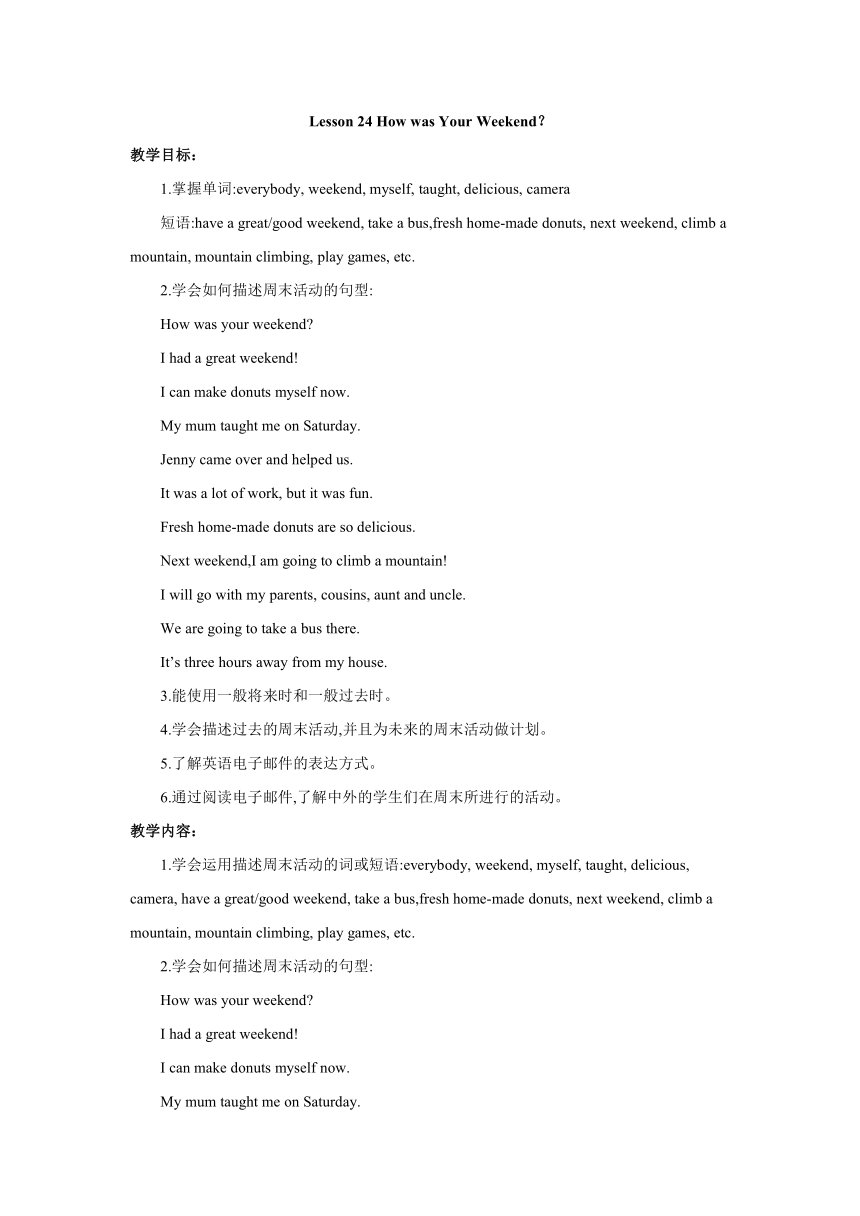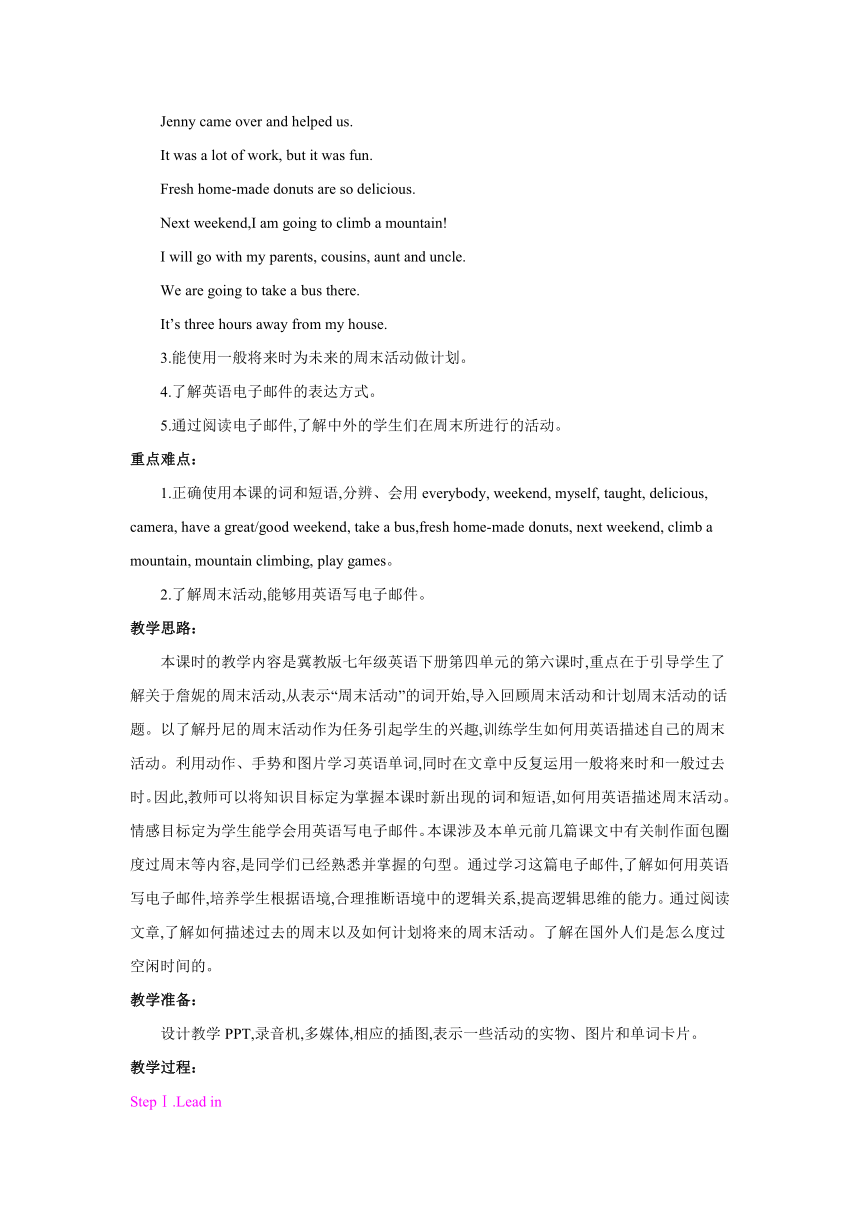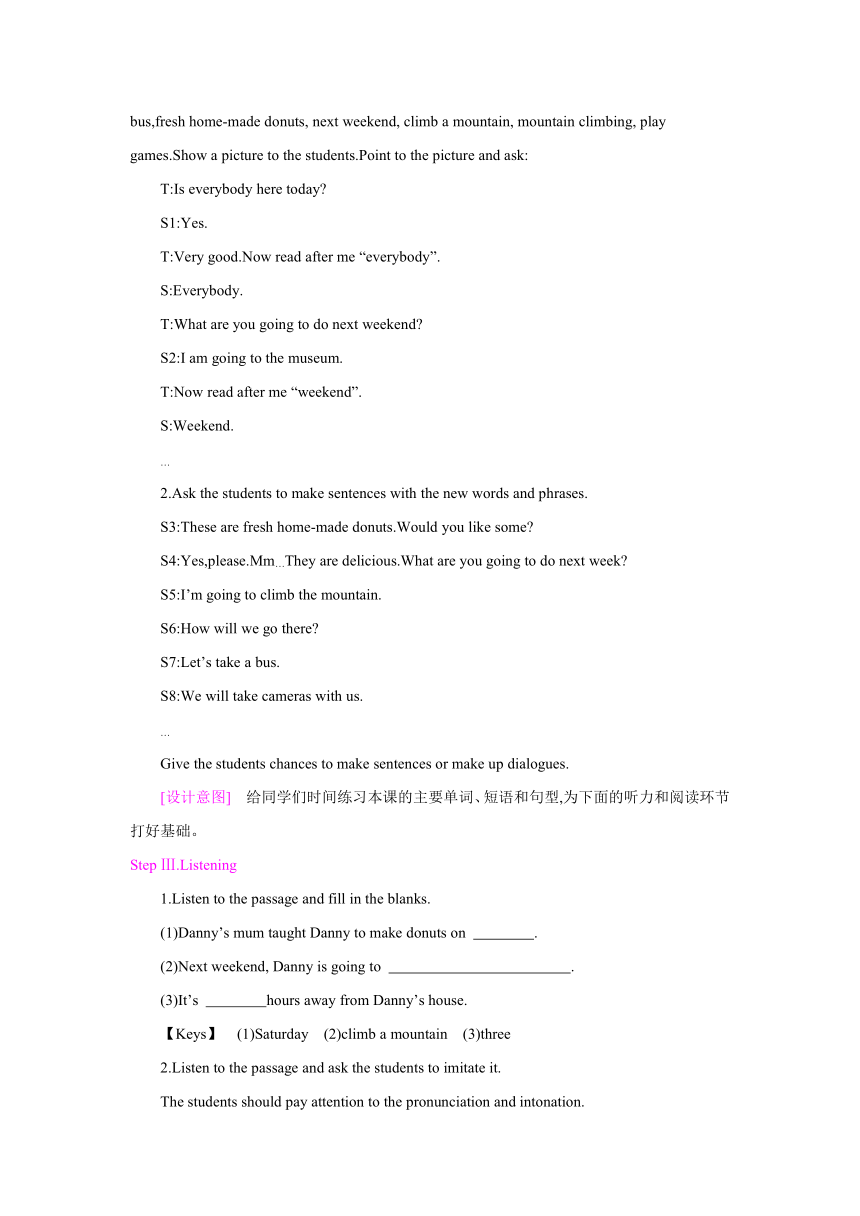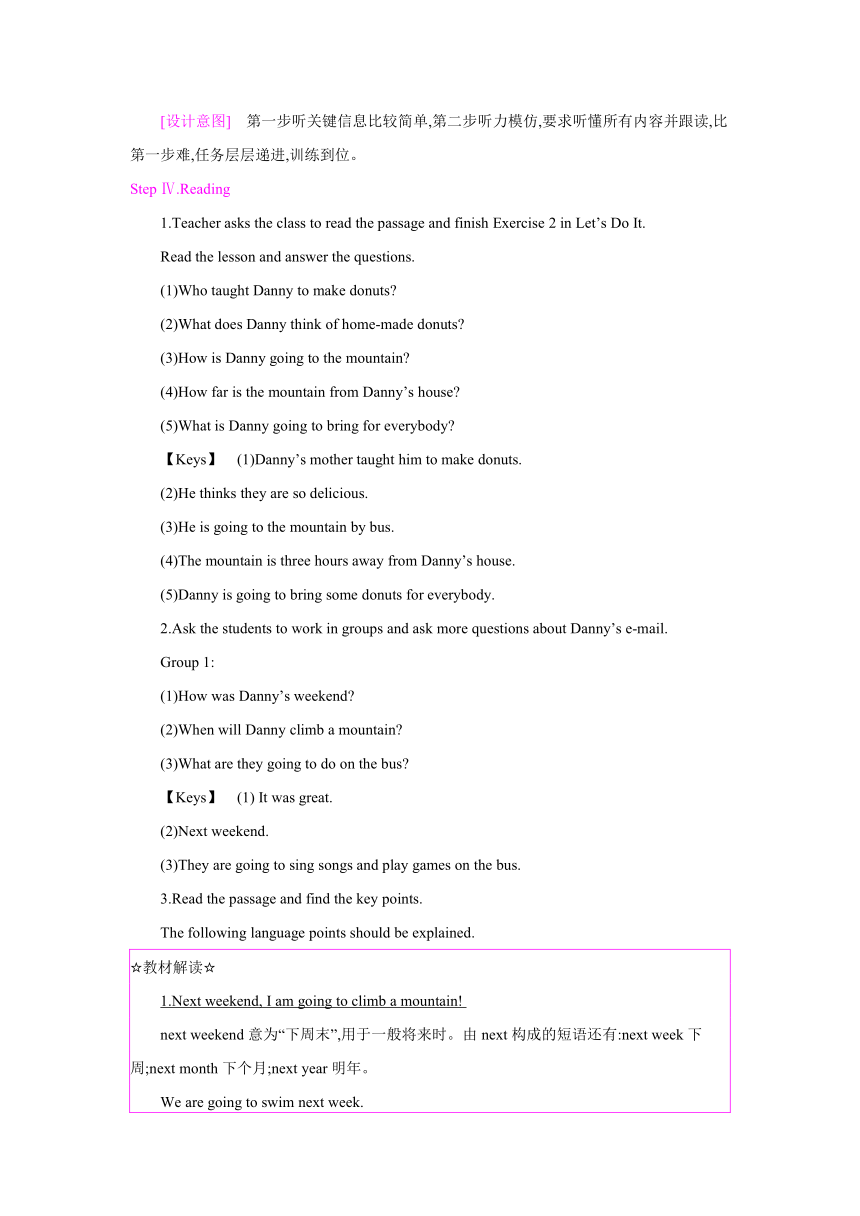Unit 4 After-School Activities Lesson 24 How was Your Weekend?教学设计
文档属性
| 名称 | Unit 4 After-School Activities Lesson 24 How was Your Weekend?教学设计 |

|
|
| 格式 | zip | ||
| 文件大小 | 28.8KB | ||
| 资源类型 | 教案 | ||
| 版本资源 | 冀教版 | ||
| 科目 | 英语 | ||
| 更新时间 | 2019-06-27 11:33:03 | ||
图片预览





文档简介
Lesson 24 How was Your Weekend?
教学目标:
1.掌握单词:everybody, weekend, myself, taught, delicious, camera
短语:have a great/good weekend, take a bus,fresh home-made donuts, next weekend, climb a mountain, mountain climbing, play games, etc.
2.学会如何描述周末活动的句型:
How was your weekend?
I had a great weekend!
I can make donuts myself now.
My mum taught me on Saturday.
Jenny came over and helped us.
It was a lot of work, but it was fun.
Fresh home-made donuts are so delicious.
Next weekend,I am going to climb a mountain!
I will go with my parents, cousins, aunt and uncle.
We are going to take a bus there.
It’s three hours away from my house.
3.能使用一般将来时和一般过去时。
4.学会描述过去的周末活动,并且为未来的周末活动做计划。
5.了解英语电子邮件的表达方式。
6.通过阅读电子邮件,了解中外的学生们在周末所进行的活动。
教学内容:
1.学会运用描述周末活动的词或短语:everybody, weekend, myself, taught, delicious, camera, have a great/good weekend, take a bus,fresh home-made donuts, next weekend, climb a mountain, mountain climbing, play games, etc.
2.学会如何描述周末活动的句型:
How was your weekend?
I had a great weekend!
I can make donuts myself now.
My mum taught me on Saturday.
Jenny came over and helped us.
It was a lot of work, but it was fun.
Fresh home-made donuts are so delicious.
Next weekend,I am going to climb a mountain!
I will go with my parents, cousins, aunt and uncle.
We are going to take a bus there.
It’s three hours away from my house.
3.能使用一般将来时为未来的周末活动做计划。
4.了解英语电子邮件的表达方式。
5.通过阅读电子邮件,了解中外的学生们在周末所进行的活动。
重点难点:
1.正确使用本课的词和短语,分辨、会用everybody, weekend, myself, taught, delicious, camera, have a great/good weekend, take a bus,fresh home-made donuts, next weekend, climb a mountain, mountain climbing, play games。
2.了解周末活动,能够用英语写电子邮件。
教学思路:
本课时的教学内容是冀教版七年级英语下册第四单元的第六课时,重点在于引导学生了解关于詹妮的周末活动,从表示“周末活动”的词开始,导入回顾周末活动和计划周末活动的话题。以了解丹尼的周末活动作为任务引起学生的兴趣,训练学生如何用英语描述自己的周末活动。利用动作、手势和图片学习英语单词,同时在文章中反复运用一般将来时和一般过去时。因此,教师可以将知识目标定为掌握本课时新出现的词和短语,如何用英语描述周末活动。情感目标定为学生能学会用英语写电子邮件。本课涉及本单元前几篇课文中有关制作面包圈度过周末等内容,是同学们已经熟悉并掌握的句型。通过学习这篇电子邮件,了解如何用英语写电子邮件,培养学生根据语境,合理推断语境中的逻辑关系,提高逻辑思维的能力。通过阅读文章,了解如何描述过去的周末以及如何计划将来的周末活动。了解在国外人们是怎么度过空闲时间的。
教学准备:
设计教学PPT,录音机,多媒体,相应的插图,表示一些活动的实物、图片和单词卡片。
教学过程:
StepⅠ.Lead in
Leading in 【情景1】
Teacher asks the students questions about how to spend a weekend.Ask students questions:“How was your weekend? Did you have a good weekend? What are you going to do next weekend?”
S1:How was your weekend?
S2:Great.
S1:What did you do?
S2:I climbed the mountains with my friends.Did you have a good weekend?
S1:Yes,I did.I went to the park with my friends.
S2:What did you do there?
S1:We played games and flew kites.
S2:What will you do next weekend?
S1:I will go to help at the Old Age Home.What about you?
S2:I will plant flowers in my garden.
…
[设计意图] 两人一组,谈论学生们的周末活动和周末计划,描述自己的亲身经历和特殊的感觉,能较好地激发同学们的学习热情。
Leading in 【情景2】
Group work:Ask the students to work in groups and discuss what they did last weekend.After a few minutes, ask some groups to make a report in front of the class.
Group 1:Jim went to climb the mountains with his friends.They saw many kinds of flowers and trees on the mountains.They saw much water on the mountains.They took many pictures on the way.Kate and her friends went to help at the Old Age Home.They helped the old men clean the rooms.They had a party for the old men.The sang and danced.They had a good time with them.
…
[设计意图] 小组合作描述上周的经历,加深对本单元内容的理解程度,复习了学过的单词、短语和句型。
StepⅡ.Presentation
1.Show the students objects or pictures and learn the new words and expressions in this part:everybody, weekend, myself, taught, delicious, camera, have a great/good weekend, take a bus,fresh home-made donuts, next weekend, climb a mountain, mountain climbing, play games.Show a picture to the students.Point to the picture and ask:
T:Is everybody here today?
S1:Yes.
T:Very good.Now read after me “everybody”.
S:Everybody.
T:What are you going to do next weekend?
S2:I am going to the museum.
T:Now read after me “weekend”.
S:Weekend.
…
2.Ask the students to make sentences with the new words and phrases.
S3:These are fresh home-made donuts.Would you like some?
S4:Yes,please.Mm…They are delicious.What are you going to do next week?
S5:I’m going to climb the mountain.
S6:How will we go there?
S7:Let’s take a bus.
S8:We will take cameras with us.
…
Give the students chances to make sentences or make up dialogues.
[设计意图] 给同学们时间练习本课的主要单词、短语和句型,为下面的听力和阅读环节打好基础。
Step Ⅲ.Listening
1.Listen to the passage and fill in the blanks.
(1)Danny’s mum taught Danny to make donuts on .?
(2)Next weekend, Danny is going to .?
(3)It’s hours away from Danny’s house.?
【Keys】 (1)Saturday (2)climb a mountain (3)three
2.Listen to the passage and ask the students to imitate it.
The students should pay attention to the pronunciation and intonation.
[设计意图] 第一步听关键信息比较简单,第二步听力模仿,要求听懂所有内容并跟读,比第一步难,任务层层递进,训练到位。
Step Ⅳ.Reading
1.Teacher asks the class to read the passage and finish Exercise 2 in Let’s Do It.
Read the lesson and answer the questions.
(1)Who taught Danny to make donuts?
(2)What does Danny think of home-made donuts?
(3)How is Danny going to the mountain?
(4)How far is the mountain from Danny’s house?
(5)What is Danny going to bring for everybody?
【Keys】 (1)Danny’s mother taught him to make donuts.
(2)He thinks they are so delicious.
(3)He is going to the mountain by bus.
(4)The mountain is three hours away from Danny’s house.
(5)Danny is going to bring some donuts for everybody.
2.Ask the students to work in groups and ask more questions about Danny’s e-mail.
Group 1:
(1)How was Danny’s weekend?
(2)When will Danny climb a mountain?
(3)What are they going to do on the bus?
【Keys】 (1) It was great.
(2)Next weekend.
(3)They are going to sing songs and play games on the bus.
3.Read the passage and find the key points.
The following language points should be explained.
☆教材解读☆
1.Next weekend, I am going to climb a mountain!?
next weekend意为“下周末”,用于一般将来时。由next构成的短语还有:next week下周;next month下个月;next year明年。
We are going to swim next week.
下周我们要去游泳。
2.Mountain climbing is so fun.?
句中的mountain climbing 是动名词短语作主语,这时谓语动词要用单数形式。
Eating more vegetables is good for health.
多吃蔬菜有益健康。
3.We are going to take a bus there.?
take a bus意为“乘坐公共汽车”。类似的短语还有:take a train乘火车;take a plane乘飞机;take the subway乘地铁。
My dad sometimes takes the subway home.我爸爸有时乘地铁回家。
4.It’s three hours away from my house.?
代词it在这里表示距离。
It is two kilometers from here to the zoo.
从这儿到动物园有两公里的路程。
【拓展】 it还可表示天气、时间。
It is warm today.今天天气暖和。
It is Sunday today.今天是星期日。
5.I’m so excited!?
【辨析】 excited,exciting
excited意为“感到兴奋的”,修饰人。exciting意为“令人感到兴奋的”,修饰物。
When we hear the news, we feel excited.当我们听到这个消息的时候,我们感到兴奋。
The film is so exciting.
这个电影如此的令人兴奋。
6.My uncle is going to bring his camera and I am going to bring some donuts for everybody.?
【辨析】 bring,take
bring意为“带来”,指从别的地方带到这里;take意为“带走”,指从这里带走。
I will bring my homework here tomorrow.
明天我会把作业带到这来。
It’s raining.Take the umbrella with you.
天在下雨。带把雨伞吧。
[设计意图] 读文章,找出问题的答案或补充文章,设计这样的阅读题有助于学生理解文章细节。
Step Ⅴ.Practice
1.Ask the students to retell the e-mail.
2.Ask the students to write an e-mail about what they did last week and what they will do next weekend.Every group chooses the best to read in front of the class.
When the students are writing, the teacher should walk around and give them advice.
[设计意图] 让学生们复述课文,然后写关于“上周进行的活动和下周将要进行的活动”的电子邮件,描述其中最精彩的环节,这是写作练习,是今天的主题的升华。
Step Ⅵ.Complete Let’s Do It!
Exercise 1 is used to practice the students’ listening.Let’s finish it in class.We have finished Exercise 2 in reading part in class.Ask the students to finish Exercise 3 in class.Teacher checks their answers in class.
[设计意图] Let’s Do It!部分中的Exercise 1重点是听说教学,我们在听力部分已经完成了。Exercise 2重点是阅读教学,在课上作为阅读任务让同学们做。Exercise 3考查同学们对单词的掌握程度。
Step Ⅶ.Task
Group work:Let’s Do It! Exercise 4.
Work in groups.What did you do last weekend?What are you going to do next weekend? Interview your group members and fill in the table.Then present it to the class.
After a few minutes, ask the students to make a report in front of the class.
[设计意图] 小组合作,采访同学们他们上周的活动以及下周将要进行的活动,掌握日常生活中一些短语的用法。主要目的是练习本单元的主要语法内容:一般将来时,同时练习本课的主要单词、短语和句型。
Step Ⅷ.Exercises
Fill in the blanks.
1.你们度过了一个愉快的周末吗?
Did you ? ?
2.同学们上周过来,帮助老人们打扫房间。
The classmates and helped the old men clean the rooms last week.?
3.秋天是爬山的好季节。
Autumn is a good season to .?
4.他们将要乘公共汽车去长城。
They are going to to the Great Wall.?
5.我们明天将要在公园里唱歌和做游戏。
We will and in the park tomorrow.?
【Keys】 1.have a great/good weekend 2.came over 3.climb a mountain/go mountain climbing 4.take a bus 5.sing songs, play games
[设计意图] 以学评教、强化落实。当堂检测主要是由本节内容组成的形成性评价,让学生们巩固本课所学内容。
Step Ⅸ.Homework
1.Learn the new words and expressions by heart.
2.Read the e-mail after class.
3.Go over what you’ve learnt in this unit.
[设计意图] 听、说、读、写相结合,全方位训练学生各方面的英语能力。
Lesson 24 How Was Your Weekend?
everybody, weekend, myself, taught, delicious,camera, mountain climbing,
have a great/good weekend, play games,
next weekend, take a bus,
fresh home-made donuts, climb a mountain
My mum taught me on Saturday.
How was your weekend?
I can make donuts myself now.
I had a great weekend!
It was a lot of work, but it was fun.
Jenny came over and helped us.
It’s three hours away from my house.
We are going to take a bus there.
Fresh home-made donuts are so delicious.
Next weekend,I am going to climb a mountain!
I will go with my parents, cousins, aunt and uncle.
教材习题解答
【Keys】
1 What did Danny do last weekend?—第2幅图
What is Danny going to do next weekend?—第
1幅图
3 1.Everybody 2.bring 3.fresh 4.climb 5.take
语法精讲
一般将来时(二)
“be going to +动词原形”结构用来表示将来的动作或状态。be going to 表示主观的打算或计划。
(一)基本句式
“be going to ”结构中的be是助动词,句子的各种变化形式都是通过它来实现的。
1.陈述句形式。
主语+be(not) going to+动词原形+其他。
I am(not) going to watch a movie this weekend.
这个周末我打算去(不去)看电影。
2.一般疑问句形式。
Be+主语+going to+动词原形+其他?回答要用到助动词be。
—Is Eric going to visit his grandparents next month?
下个月艾瑞克会去看望他的祖父母吗?
—Yes, he is.是的,他会去。
—No, he isn’t.不,他不会去。
3.特殊疑问句形式。
特殊疑问词+be+主语+going to+动词原形+其他?
What are you going to do this Sunday?
这个周日你打算做什么?
【拓展】 疑问词为Who时,特殊疑问句的结构是“Who is/are going to+动词原形?”。
Who is going to clean the room? 谁来打扫房间?
(二)运用情景
1.用来表示计划或安排好要做的事。
How are they going to plan the picnic?他们将怎样计划这次野餐?(野餐这件事已经确定了)
2.表示主观上打算在将来的某个时间要做的事,常与表示将来的时间状语连用。
I’m going to help at home this Sunday.
这个周日,我要在家里帮忙。
3.用来表示从某种迹象上表现出要发生或可能发生的事,但客观上也不一定就会发生。
There are heavy clouds in the sky.It is going to rain.天空中布满乌云。要下雨了。
(三)特殊情况
1.come,go,leave,fly, take off(起飞)等动词(短语)常用现在进行时的结构表示将要发生的动作,因此不必再用“be going to”结构。
I’m going to school.我要去上学。
2.“There be…”句型中的be going to 结构要写成:“There is/are going to be…”, to之后的be才是“There be…”结构中的be动词。
There is going to be a heavy rain this afternoon.
今天下午有大雨。
教学目标:
1.掌握单词:everybody, weekend, myself, taught, delicious, camera
短语:have a great/good weekend, take a bus,fresh home-made donuts, next weekend, climb a mountain, mountain climbing, play games, etc.
2.学会如何描述周末活动的句型:
How was your weekend?
I had a great weekend!
I can make donuts myself now.
My mum taught me on Saturday.
Jenny came over and helped us.
It was a lot of work, but it was fun.
Fresh home-made donuts are so delicious.
Next weekend,I am going to climb a mountain!
I will go with my parents, cousins, aunt and uncle.
We are going to take a bus there.
It’s three hours away from my house.
3.能使用一般将来时和一般过去时。
4.学会描述过去的周末活动,并且为未来的周末活动做计划。
5.了解英语电子邮件的表达方式。
6.通过阅读电子邮件,了解中外的学生们在周末所进行的活动。
教学内容:
1.学会运用描述周末活动的词或短语:everybody, weekend, myself, taught, delicious, camera, have a great/good weekend, take a bus,fresh home-made donuts, next weekend, climb a mountain, mountain climbing, play games, etc.
2.学会如何描述周末活动的句型:
How was your weekend?
I had a great weekend!
I can make donuts myself now.
My mum taught me on Saturday.
Jenny came over and helped us.
It was a lot of work, but it was fun.
Fresh home-made donuts are so delicious.
Next weekend,I am going to climb a mountain!
I will go with my parents, cousins, aunt and uncle.
We are going to take a bus there.
It’s three hours away from my house.
3.能使用一般将来时为未来的周末活动做计划。
4.了解英语电子邮件的表达方式。
5.通过阅读电子邮件,了解中外的学生们在周末所进行的活动。
重点难点:
1.正确使用本课的词和短语,分辨、会用everybody, weekend, myself, taught, delicious, camera, have a great/good weekend, take a bus,fresh home-made donuts, next weekend, climb a mountain, mountain climbing, play games。
2.了解周末活动,能够用英语写电子邮件。
教学思路:
本课时的教学内容是冀教版七年级英语下册第四单元的第六课时,重点在于引导学生了解关于詹妮的周末活动,从表示“周末活动”的词开始,导入回顾周末活动和计划周末活动的话题。以了解丹尼的周末活动作为任务引起学生的兴趣,训练学生如何用英语描述自己的周末活动。利用动作、手势和图片学习英语单词,同时在文章中反复运用一般将来时和一般过去时。因此,教师可以将知识目标定为掌握本课时新出现的词和短语,如何用英语描述周末活动。情感目标定为学生能学会用英语写电子邮件。本课涉及本单元前几篇课文中有关制作面包圈度过周末等内容,是同学们已经熟悉并掌握的句型。通过学习这篇电子邮件,了解如何用英语写电子邮件,培养学生根据语境,合理推断语境中的逻辑关系,提高逻辑思维的能力。通过阅读文章,了解如何描述过去的周末以及如何计划将来的周末活动。了解在国外人们是怎么度过空闲时间的。
教学准备:
设计教学PPT,录音机,多媒体,相应的插图,表示一些活动的实物、图片和单词卡片。
教学过程:
StepⅠ.Lead in
Leading in 【情景1】
Teacher asks the students questions about how to spend a weekend.Ask students questions:“How was your weekend? Did you have a good weekend? What are you going to do next weekend?”
S1:How was your weekend?
S2:Great.
S1:What did you do?
S2:I climbed the mountains with my friends.Did you have a good weekend?
S1:Yes,I did.I went to the park with my friends.
S2:What did you do there?
S1:We played games and flew kites.
S2:What will you do next weekend?
S1:I will go to help at the Old Age Home.What about you?
S2:I will plant flowers in my garden.
…
[设计意图] 两人一组,谈论学生们的周末活动和周末计划,描述自己的亲身经历和特殊的感觉,能较好地激发同学们的学习热情。
Leading in 【情景2】
Group work:Ask the students to work in groups and discuss what they did last weekend.After a few minutes, ask some groups to make a report in front of the class.
Group 1:Jim went to climb the mountains with his friends.They saw many kinds of flowers and trees on the mountains.They saw much water on the mountains.They took many pictures on the way.Kate and her friends went to help at the Old Age Home.They helped the old men clean the rooms.They had a party for the old men.The sang and danced.They had a good time with them.
…
[设计意图] 小组合作描述上周的经历,加深对本单元内容的理解程度,复习了学过的单词、短语和句型。
StepⅡ.Presentation
1.Show the students objects or pictures and learn the new words and expressions in this part:everybody, weekend, myself, taught, delicious, camera, have a great/good weekend, take a bus,fresh home-made donuts, next weekend, climb a mountain, mountain climbing, play games.Show a picture to the students.Point to the picture and ask:
T:Is everybody here today?
S1:Yes.
T:Very good.Now read after me “everybody”.
S:Everybody.
T:What are you going to do next weekend?
S2:I am going to the museum.
T:Now read after me “weekend”.
S:Weekend.
…
2.Ask the students to make sentences with the new words and phrases.
S3:These are fresh home-made donuts.Would you like some?
S4:Yes,please.Mm…They are delicious.What are you going to do next week?
S5:I’m going to climb the mountain.
S6:How will we go there?
S7:Let’s take a bus.
S8:We will take cameras with us.
…
Give the students chances to make sentences or make up dialogues.
[设计意图] 给同学们时间练习本课的主要单词、短语和句型,为下面的听力和阅读环节打好基础。
Step Ⅲ.Listening
1.Listen to the passage and fill in the blanks.
(1)Danny’s mum taught Danny to make donuts on .?
(2)Next weekend, Danny is going to .?
(3)It’s hours away from Danny’s house.?
【Keys】 (1)Saturday (2)climb a mountain (3)three
2.Listen to the passage and ask the students to imitate it.
The students should pay attention to the pronunciation and intonation.
[设计意图] 第一步听关键信息比较简单,第二步听力模仿,要求听懂所有内容并跟读,比第一步难,任务层层递进,训练到位。
Step Ⅳ.Reading
1.Teacher asks the class to read the passage and finish Exercise 2 in Let’s Do It.
Read the lesson and answer the questions.
(1)Who taught Danny to make donuts?
(2)What does Danny think of home-made donuts?
(3)How is Danny going to the mountain?
(4)How far is the mountain from Danny’s house?
(5)What is Danny going to bring for everybody?
【Keys】 (1)Danny’s mother taught him to make donuts.
(2)He thinks they are so delicious.
(3)He is going to the mountain by bus.
(4)The mountain is three hours away from Danny’s house.
(5)Danny is going to bring some donuts for everybody.
2.Ask the students to work in groups and ask more questions about Danny’s e-mail.
Group 1:
(1)How was Danny’s weekend?
(2)When will Danny climb a mountain?
(3)What are they going to do on the bus?
【Keys】 (1) It was great.
(2)Next weekend.
(3)They are going to sing songs and play games on the bus.
3.Read the passage and find the key points.
The following language points should be explained.
☆教材解读☆
1.Next weekend, I am going to climb a mountain!?
next weekend意为“下周末”,用于一般将来时。由next构成的短语还有:next week下周;next month下个月;next year明年。
We are going to swim next week.
下周我们要去游泳。
2.Mountain climbing is so fun.?
句中的mountain climbing 是动名词短语作主语,这时谓语动词要用单数形式。
Eating more vegetables is good for health.
多吃蔬菜有益健康。
3.We are going to take a bus there.?
take a bus意为“乘坐公共汽车”。类似的短语还有:take a train乘火车;take a plane乘飞机;take the subway乘地铁。
My dad sometimes takes the subway home.我爸爸有时乘地铁回家。
4.It’s three hours away from my house.?
代词it在这里表示距离。
It is two kilometers from here to the zoo.
从这儿到动物园有两公里的路程。
【拓展】 it还可表示天气、时间。
It is warm today.今天天气暖和。
It is Sunday today.今天是星期日。
5.I’m so excited!?
【辨析】 excited,exciting
excited意为“感到兴奋的”,修饰人。exciting意为“令人感到兴奋的”,修饰物。
When we hear the news, we feel excited.当我们听到这个消息的时候,我们感到兴奋。
The film is so exciting.
这个电影如此的令人兴奋。
6.My uncle is going to bring his camera and I am going to bring some donuts for everybody.?
【辨析】 bring,take
bring意为“带来”,指从别的地方带到这里;take意为“带走”,指从这里带走。
I will bring my homework here tomorrow.
明天我会把作业带到这来。
It’s raining.Take the umbrella with you.
天在下雨。带把雨伞吧。
[设计意图] 读文章,找出问题的答案或补充文章,设计这样的阅读题有助于学生理解文章细节。
Step Ⅴ.Practice
1.Ask the students to retell the e-mail.
2.Ask the students to write an e-mail about what they did last week and what they will do next weekend.Every group chooses the best to read in front of the class.
When the students are writing, the teacher should walk around and give them advice.
[设计意图] 让学生们复述课文,然后写关于“上周进行的活动和下周将要进行的活动”的电子邮件,描述其中最精彩的环节,这是写作练习,是今天的主题的升华。
Step Ⅵ.Complete Let’s Do It!
Exercise 1 is used to practice the students’ listening.Let’s finish it in class.We have finished Exercise 2 in reading part in class.Ask the students to finish Exercise 3 in class.Teacher checks their answers in class.
[设计意图] Let’s Do It!部分中的Exercise 1重点是听说教学,我们在听力部分已经完成了。Exercise 2重点是阅读教学,在课上作为阅读任务让同学们做。Exercise 3考查同学们对单词的掌握程度。
Step Ⅶ.Task
Group work:Let’s Do It! Exercise 4.
Work in groups.What did you do last weekend?What are you going to do next weekend? Interview your group members and fill in the table.Then present it to the class.
After a few minutes, ask the students to make a report in front of the class.
[设计意图] 小组合作,采访同学们他们上周的活动以及下周将要进行的活动,掌握日常生活中一些短语的用法。主要目的是练习本单元的主要语法内容:一般将来时,同时练习本课的主要单词、短语和句型。
Step Ⅷ.Exercises
Fill in the blanks.
1.你们度过了一个愉快的周末吗?
Did you ? ?
2.同学们上周过来,帮助老人们打扫房间。
The classmates and helped the old men clean the rooms last week.?
3.秋天是爬山的好季节。
Autumn is a good season to .?
4.他们将要乘公共汽车去长城。
They are going to to the Great Wall.?
5.我们明天将要在公园里唱歌和做游戏。
We will and in the park tomorrow.?
【Keys】 1.have a great/good weekend 2.came over 3.climb a mountain/go mountain climbing 4.take a bus 5.sing songs, play games
[设计意图] 以学评教、强化落实。当堂检测主要是由本节内容组成的形成性评价,让学生们巩固本课所学内容。
Step Ⅸ.Homework
1.Learn the new words and expressions by heart.
2.Read the e-mail after class.
3.Go over what you’ve learnt in this unit.
[设计意图] 听、说、读、写相结合,全方位训练学生各方面的英语能力。
Lesson 24 How Was Your Weekend?
everybody, weekend, myself, taught, delicious,camera, mountain climbing,
have a great/good weekend, play games,
next weekend, take a bus,
fresh home-made donuts, climb a mountain
My mum taught me on Saturday.
How was your weekend?
I can make donuts myself now.
I had a great weekend!
It was a lot of work, but it was fun.
Jenny came over and helped us.
It’s three hours away from my house.
We are going to take a bus there.
Fresh home-made donuts are so delicious.
Next weekend,I am going to climb a mountain!
I will go with my parents, cousins, aunt and uncle.
教材习题解答
【Keys】
1 What did Danny do last weekend?—第2幅图
What is Danny going to do next weekend?—第
1幅图
3 1.Everybody 2.bring 3.fresh 4.climb 5.take
语法精讲
一般将来时(二)
“be going to +动词原形”结构用来表示将来的动作或状态。be going to 表示主观的打算或计划。
(一)基本句式
“be going to ”结构中的be是助动词,句子的各种变化形式都是通过它来实现的。
1.陈述句形式。
主语+be(not) going to+动词原形+其他。
I am(not) going to watch a movie this weekend.
这个周末我打算去(不去)看电影。
2.一般疑问句形式。
Be+主语+going to+动词原形+其他?回答要用到助动词be。
—Is Eric going to visit his grandparents next month?
下个月艾瑞克会去看望他的祖父母吗?
—Yes, he is.是的,他会去。
—No, he isn’t.不,他不会去。
3.特殊疑问句形式。
特殊疑问词+be+主语+going to+动词原形+其他?
What are you going to do this Sunday?
这个周日你打算做什么?
【拓展】 疑问词为Who时,特殊疑问句的结构是“Who is/are going to+动词原形?”。
Who is going to clean the room? 谁来打扫房间?
(二)运用情景
1.用来表示计划或安排好要做的事。
How are they going to plan the picnic?他们将怎样计划这次野餐?(野餐这件事已经确定了)
2.表示主观上打算在将来的某个时间要做的事,常与表示将来的时间状语连用。
I’m going to help at home this Sunday.
这个周日,我要在家里帮忙。
3.用来表示从某种迹象上表现出要发生或可能发生的事,但客观上也不一定就会发生。
There are heavy clouds in the sky.It is going to rain.天空中布满乌云。要下雨了。
(三)特殊情况
1.come,go,leave,fly, take off(起飞)等动词(短语)常用现在进行时的结构表示将要发生的动作,因此不必再用“be going to”结构。
I’m going to school.我要去上学。
2.“There be…”句型中的be going to 结构要写成:“There is/are going to be…”, to之后的be才是“There be…”结构中的be动词。
There is going to be a heavy rain this afternoon.
今天下午有大雨。
同课章节目录
- Unit 1 A Trip to the Silk Road
- Lesson 1 A Trip to China
- Lesson 2 Meet You in Beijing
- Lesson 3 A Visit to Xi'an
- Lesson 4 A Visit to Lanzhou
- Lesson 5 Another Stop along the Silk Road
- Lesson 6 Jenny's Diary
- Unit 2 It's Show Time!
- Lesson 7 What's Your Project about?
- Lesson 8 Marco Polo and the Silk Road
- Lesson 9 Danny's School Project
- Lesson 10 Music and Dance
- Lesson 11 Food in China
- Lesson 12 A Blog about the Silk Road
- Unit 3 School Life
- Lesson 13 How Is School Going?
- Lesson 14 Jenny's School Life
- Lesson 15 Making a Difference
- Lesson 16 We Are with You!
- Lesson 17 School Science Fai
- Lesson 18 Teaching in China
- Unit 4 After-School Activities
- Lesson 19 A Dinner Date
- Lesson 20 Join Our Club!
- Lesson 21 What Is Your Club Type?
- Lesson 22 Big Plans for the Weekend
- Lesson 23 A Weekend with Grandma
- Lesson 24 How was Your Weekend?
- Unit 5 I Love Learning English!
- Lesson 25 A Phone Friend
- Lesson 26 Online Phone Calls
- Lesson 27 Amazing English
- Lesson 28 How Do I Learn English?
- Lesson 29 A Door to the World
- Lesson 30 Writing an E-mail in English
- Unit 6 Seasons
- Lesson 31 What Strange Weather!
- Lesson 32 I Can't Wait for Winter!
- Lesson 33 Kim's Favourite Season
- Lesson 34 Steven's Report
- Lesson 35 Surfing in Sydney
- Lesson 36 Spring in China
- Unit 7 Sports and Good Health
- Lesson 37 You Are What You Eat!
- Lesson 38 Stay Healthy!
- Lesson 39 Danny's Report
- Lesson 40 Move Your Body
- Lesson 41 Were People Healthy Then?
- Lesson 42 Know Yourself
- Unit 8 Summer Holiday Is Coming!
- Lesson 43 Have a Good Summer!
- Lesson 44 Volunteering in Summe
- Lesson 45 Baseball Season
- Lesson 46 Get Ready for Summer Holiday!
- Lesson 47 Summer Plans
- Lesson 48 Li Ming's Summer Holiday
